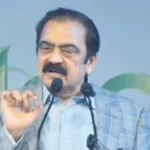ISLAMABAD The terms “conspiracy” and “threat” were not used in the diplomatic cable that was received from the US, according to Asad Majeed, a former Pakistani ambassador to the US and witness in the cipher case, as The News reported on Wednesday.
The ex-envoy’s statement was made on Tuesday during the Special Court of Official Secrets Act hearing for the cipher case, which was presided over by Judge Abual Hasnat Zulqarnain. Five other witnesses also gave statements during the proceedings, which were recorded in the case against Imran Khan, the founder of the Pakistan Tehreek-e-Insaf (PTI), and former foreign minister Shah Mahmood Qureshi.
The hearing, which was postponed until today (Wednesday), was conducted at the Adiala jail in Rawalpindi. Qureshi and Khan both made an appearance in the courtroom,
while Majeed, Faisal Tirmizi, and Akbar Durrani—two of the six prosecution witnesses—were also present.
According to the former envoy, he served as Pakistan’s ambassador to the US from January 2019 to March 2022. Donald Lu, the US Department of State’s Assistant Secretary for South and Central Asian Affairs, received an invitation to a working lunch on March 7, 2022. The meeting was scheduled in advance and was held at Pakistan House in Washington.
A telegram sent to the foreign secretary in cipher was transmitted after communication during the conference. The meeting was also attended by the defense attaché and the deputy head of mission.
Both parties to the meeting were aware that minutes were being taken.A encrypted telegram was sent to Islamabad detailing the meeting’s conversation. The covert cipher telegraph made no mention of the terms “threat” or “conspiracy.”
Majeed also informed the court that he received a call for the meeting of the National Security Committee. It was also determined to issue demarche during the meeting.
“I had suggested issuing the demarche.”
He claimed that the cipher problem was a blow to ties between the US and Pakistan.
The cross-examination of the witnesses will begin today with the attorneys for Qureshi and the founder of the PTI. The cipher case contains recorded witness statements from a total of twenty-five witnesses.
Qureshi announced that his nomination papers from NA-151 and PP-218 had been turned down when the hearing first began.
He said, “I had requested confirmation of the nomination papers, and the judge had asked me to attach his order. However, the nomination papers were rejected in spite of the judge’s decision.
When prosecutor Raja Rizwan Abbasi spoke at the event, Qureshi became enraged. “I am talking about my fundamental rights, why are you interrupting?” the PTI leader questioned.
“If you have come from above?” Qureshi questioned. You are who you are? What position do you hold in society?
Abbasi gave the same coin response. The judge persisted in telling Qureshi to remain composed.
The PTI chief filed an appeal to overturn the nomination papers’ denial. The count would investigate this request, the judge stated, adding that it was within his rights.
The judge also stated, “You will get the rights you have.”







